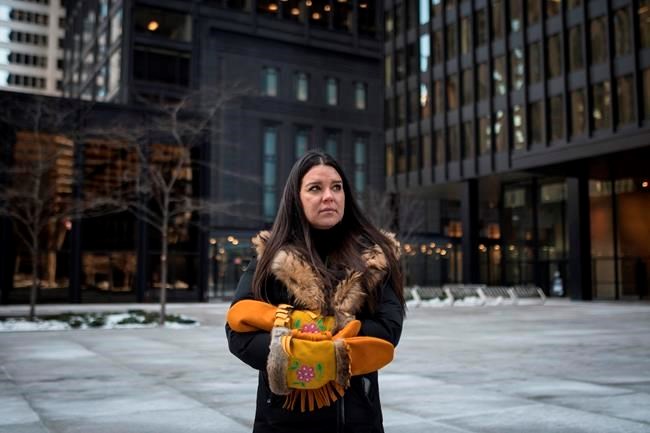TORONTO — As Krystal Abotossaway navigated corporate Canada over the last decade, the Toronto woman with Anishinaabe Kwe heritage always paid always took care to be on time, to watch her drinking at after-work events and to be agreeable in meetings.
"I didn't want to show when I was angry or that I disagreed with my peers," said Abotossaway, TD Bank Group's senior manager of diversity and inclusion and the president of the Indigenous Professional Association of Canada.
"I didn't have the same privilege as non-Indigenous people and I was aware of it."
Those decisions were her way of staying "on guard" — something many Indigenous workers in Canada say they must do to protect themselves from biases and discrimination at work, a study released Wednesday found.
The report from equity organization Catalyst Canada says about 52 per cent of the 86 Indigenous people surveyed are "on guard" at work and about 60 per cent feel psychologically unsafe on the job.
The study was based on a survey of 820 Canadian workers from various underrepresented groups, but Catalyst isolated results from Indigenous respondents for this report because their need to feel on guard was so significant.
The report, which interviewed Indigenous people from the C-Suite all the way to down to non-management roles, found the majority experience an "emotional tax" — a feeling of being different from peers at work because of gender, race or ethnicity, which can affect a person's well-being and ability to thrive.
“Indigenous people in Canada, especially women, continue to face some of the workplaces’ most entrenched hurdles, including bias and discrimination that impact their health, well-being, and ability to progress,” said Vandana Juneja, Catalyst Canada's executive director, in a statement.
Her survey uncovered that only four in 10 Indigenous workers feel safe enough to make mistakes and take risks without being penalized.
Indigenous employees who don't feel psychologically safe are less likely to report a sense of belonging or being valued for their uniqueness, speak up when something isn’t right and be able to share their creativity at work, said Catalyst.
That feeling of lacking safety doubles when gender is taken into account.
About 67 per cent of the Indigenous women surveyed — that's two of every three — reported that they feel the need to be "on guard" at work, in comparison to 38 per cent of Indigenous men.
"As a woman, there is definitely always a need to prove you deserve to be there," said Tabatha Bull, an engineer and chief executive at the Canadian Council for Aboriginal Business.
She finds Indigenous workers often feel torn between being true to themselves and ignoring colleagues' unconscious biases, so they can seem amenable to corporate culture.
That's why some Indigenous workers will stay "on guard" and not complain when colleagues refer to meetings as powwows or use idioms such as "too many chiefs and not enough Indians."
"There's only so many times that you can raise your hand and say that's not appropriate," said Bull.
She wishes more people would take a moment to think about who they are listening to in meetings and what speakers' comments make them avert their attention. There's a good chance the exercise will expose a bias, she said.
Managers, she added, also have a duty to think about who rarely speaks up in their departments and consider whether that's because they may be "on guard" or carrying an emotional tax.
Meanwhile, Abotossaway believes the emotional tax can be conquered if workplaces help to educate people about Indigenous history and correct misrepresentations that popular culture has generated.
A hard look at why people with Indigenous heritage are under-represented on Bay St. despite comprising almost 5 per cent of the country's population is also needed, she said.
"We're not really represented in a lot of different fields like law and consulting and finance. And there are big employers there and a lot of really amazing careers there," she said.
Abotossaway took on the role as president of the Indigenous Professional Association of Canada because she is anxious to help more Indigenous people find a sense of community, especially if they've left reserves or rural towns for big cities where they have fewer connections.
Being able to draw on the organization's network and connect with people who have faced challenges like hers has helped her professionally, where she finds the need to be "on guard" has been melting away.
This report by The Canadian Press was first published Feb. 10, 2021.
Companies in this story: (TSX:TD)
Tara Deschamps, The Canadian Press



